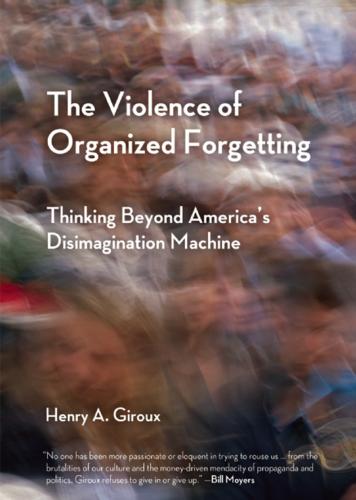The Violence
of Organized Forgetting
THINKING BEYOND AMERICA’S
DISIMAGINATION MACHINE
Henry A. Giroux
Open Media Series | City Lights Books
Copyright © 2014 by Henry A. Giroux
All Rights Reserved
ISBN: 9780872866195
Open Media Series editor: Greg Ruggiero
Cover design by John Yates at Stealworks.com
Library of Congress Cataloging-in-Publication Data Giroux, Henry A.
The violence of organized forgetting : thinking beyond America’s disimagination machine / Henry A. Giroux.
pages cm. — (City lights open media)
Includes bibliographical references and index.
ISBN 978-0-87286-619-5 (paperback)
1. Political culture—United States. 2. Corporate power—United States. 3. Mass media—Political aspects—United States. 4. Power (Social sciences)—United States. 5. Social values—Political aspects—United States. 6. Collective memory—Political aspects—United States. I. Title.
JK1726.G57 2014
306.20973—dc23
2014006179
City Lights Books are published at the City Lights Bookstore, 261 Columbus Avenue, San Francisco, CA 94133.
To Susan, again and again To Rob, Ray, and Reno, my working-class comrades
PRAISE FOR HENRY A. GIROUX
“Giroux lays out a blistering critique of an America governed by the tenets of a market economy. . . . He cites French philosopher Georges Didi-Huberman’s concept of the ‘disimagination machine’ to describe a culture and pedagogical philosophy that short-circuits citizens’ ability to think critically, leaving the generation now reaching adulthood unprepared for an ‘inhospitable’ world. Picking apart the current malaise of 21st-century digital disorder, Giroux describes a world in which citizenship is replaced by consumerism and the functions of engaged governance are explicitly beholden to corporations.”
— Publishers Weekly
“In terms that are both eloquent and prophetic, Henry Giroux succeeds in raising the ante in the current debate about America’s madness. His concept of disimagination captures the emotional as well as the material dimensions of the Western crisis. Beyond economic distress, Giroux paints a far more comprehensive portrait of the alarming descent into violence that afflicts our societies. Yet, as is Giroux’s wont, he does not leave us hanging. The final section of the book is a ringing affirmation of hope and struggle for the revival of the radical imagination.”
—Stanley Aronowitz, author of Taking it Big: C.Wright Mills and the Making of Political Intellectuals
“One of the twelve Canadians changing the way we think.”
—Toronto Star
“Once again Henry Giroux shows why he is one of the most important public intellectuals in the world today . . . he positively reinforces his commitment to a critical pedagogy that refuses to accept the inevitability of the abuses of power that appear right before our eyes.”
—Brad Evans, founder/director, Histories of Violence Project, University of Bristol
“Henry Giroux is one of our most important public intellectuals. Though he vividly describes the privatization of compassion, the rapid decline of higher education’s commitment to democracy and shared notions of the public good, the force of Giroux’s writings shows us we are not alone and there is power in his arguments of resistance.”
—David H. Price, professor of anthropology, St. Martin’s University
Contents
INTRODUCTION
AMERICA’S DESCENT INTO MADNESS
America has entered one of its periods of historical madness, but this is the worst I can remember: worse than McCarthyism, worse than the Bay of Pigs and in the long term potentially more disastrous than the Vietnam war.
—John Le Carré
America is descending into madness. The stories it now tells are filled with cruelty, deceit, lies, and legitimate all manner of corruption and mayhem. The mainstream media spin stories that are largely racist, violent, and irresponsible—stories that celebrate power and demonize victims, all the while camouflaging their pedagogical influence under the glossy veneer of entertainment. Violence now offers the only currency with any enduring value for mediating relationships, addressing problems, or offering instant pleasure. A predatory culture celebrates a narcissistic hyper-individualism that radiates a near sociopathic lack of interest in—or compassion and responsibility for—others. Anti-public intellectuals who dominate the screen and aural cultures urge us to spend more, indulge more, and make a virtue out of the pursuit of personal gain, while producing a depoliticized culture of consumerism. Undermining life-affirming social solidarities and any viable notion of the public good, politicians trade in forms of idiocy and superstition that seem to mesmerize the undereducated and render the thoughtful cynical and disengaged. Militarized police forces armed with the latest weapons tested in Afghanistan and Iraq play out their fantasies on the home front by forming robo-SWAT teams that willfully assault protesters and raid neighborhood poker games.1 Congressional lobbyists hired by big corporations and defense contractors create conditions in which war zones abroad can be re-created
